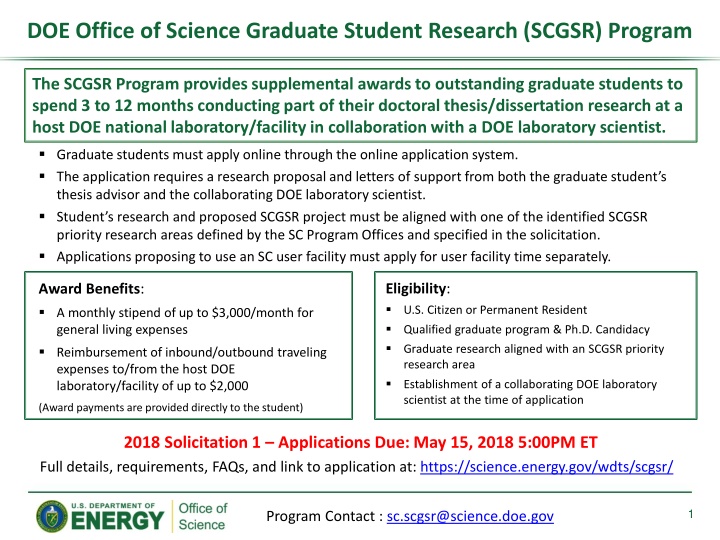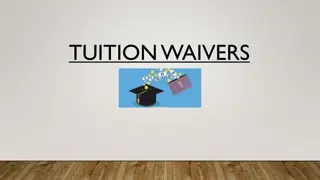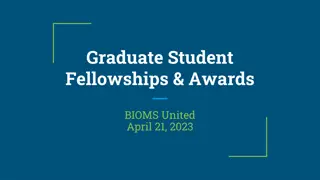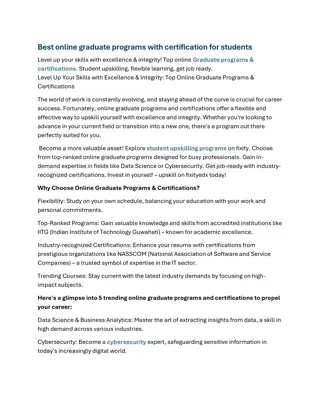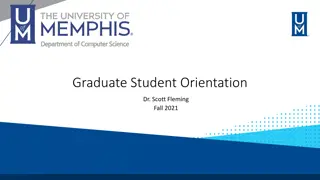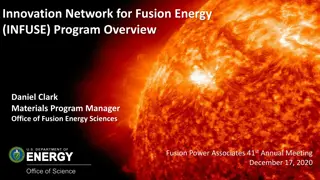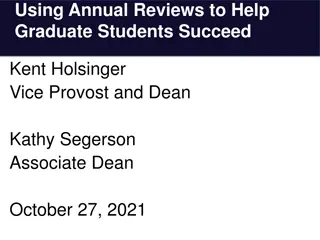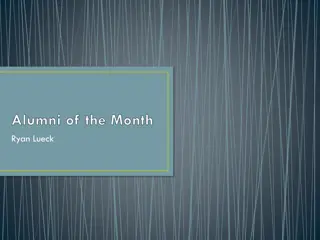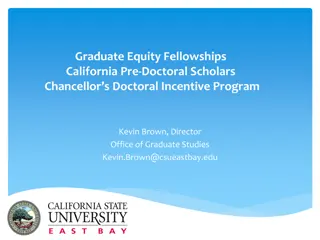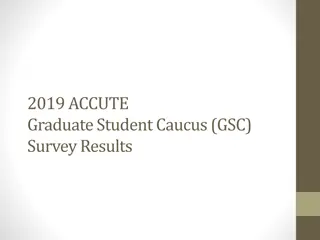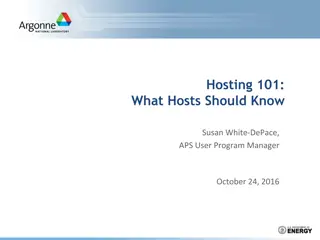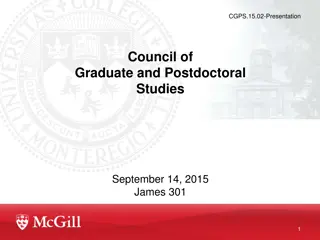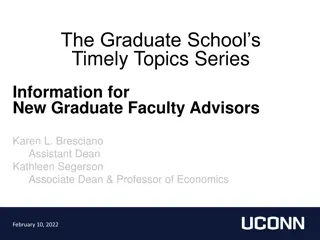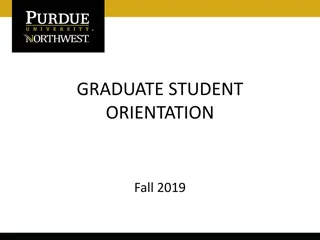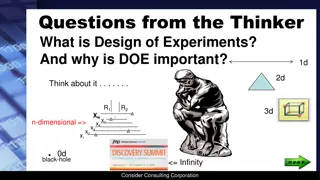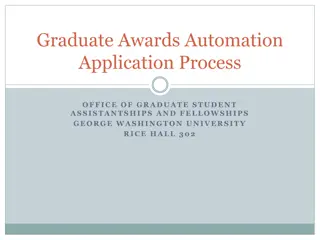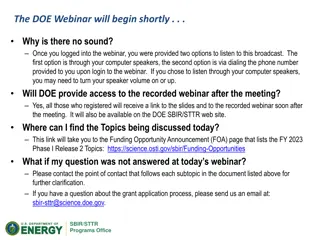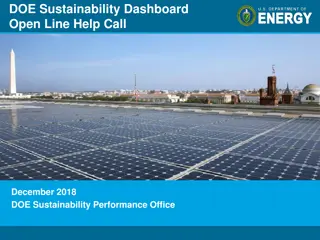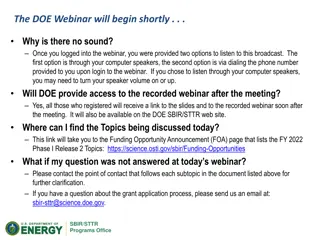DOE SCGSR Program for Graduate Student Research
The SCGSR Program offers supplemental awards for exceptional graduate students to conduct part of their doctoral thesis research at a DOE national laboratory or facility. Eligible students can receive a monthly stipend and travel expenses reimbursement. Applications must align with SCGSR priority research areas and involve collaboration with a DOE laboratory scientist. Key dates, eligibility requirements, and application details can be found on the official program website.
Uploaded on Apr 12, 2025 | 0 Views
Download Presentation

Please find below an Image/Link to download the presentation.
The content on the website is provided AS IS for your information and personal use only. It may not be sold, licensed, or shared on other websites without obtaining consent from the author.If you encounter any issues during the download, it is possible that the publisher has removed the file from their server.
You are allowed to download the files provided on this website for personal or commercial use, subject to the condition that they are used lawfully. All files are the property of their respective owners.
The content on the website is provided AS IS for your information and personal use only. It may not be sold, licensed, or shared on other websites without obtaining consent from the author.
E N D
Presentation Transcript
DOE Office of Science Graduate Student Research (SCGSR) Program The SCGSR Program provides supplemental awards to outstanding graduate students to spend 3 to 12 months conducting part of their doctoral thesis/dissertation research at a host DOE national laboratory/facility in collaboration with a DOE laboratory scientist. Graduate students must apply online through the online application system. The application requires a research proposal and letters of support from both the graduate student s thesis advisor and the collaborating DOE laboratory scientist. Student s research and proposed SCGSR project must be aligned with one of the identified SCGSR priority research areas defined by the SC Program Offices and specified in the solicitation. Applications proposing to use an SC user facility must apply for user facility time separately. Eligibility: U.S. Citizen or Permanent Resident Qualified graduate program & Ph.D. Candidacy Graduate research aligned with an SCGSR priority research area Establishment of a collaborating DOE laboratory scientist at the time of application Award Benefits: A monthly stipend of up to $3,000/month for general living expenses Reimbursement of inbound/outbound traveling expenses to/from the host DOE laboratory/facility of up to $2,000 (Award payments are provided directly to the student) 2018 Solicitation 1 Applications Due: May 15, 2018 5:00PM ET Full details, requirements, FAQs, and link to application at: https://science.energy.gov/wdts/scgsr/ 1 Program Contact : sc.scgsr@science.doe.gov
Key Dates for 2017 -2018 All application materials (including the Letters of Support) must be submitted online as required. At the submission deadline (shown in red in the table below), the online application system will close after which no additional materials will be accepted. The online application system closes at 5:00 PM Eastern Time. 2017 Solicitation 2 2018 Solicitation 1 2018 Solicitation 2*** On-line Application Opens August 24, 2017 February 21, 2018 August 2018 November 16, 2017 5:00 PM ET May 15, 2018 5:00 PM ET November 2018 Applications Due Offer Notification Period Begins on or around April 2018 August/September 2018 April 2019 Earliest* Start Date for Proposed Project Periods June 4, 2018 October 29, 2018 June 3, 2019 Latest** Start Date for Proposed Project Periods October 1, 2018 March 4, 2019 September 30, 2019 *Proposed project periods may not begin before this date, and may be 3 to 12 consecutive months in duration. ** Proposed project period must begin no later than this date, and may be 3 to 12 consecutive months in duration. *** All Dates are tentative. 2 https://science.energy.gov/wdts/scgsr/key-dates/
SCGSR Program 2018 Solicitation 1 Priority Research Areas Advanced Scientific Computing Research (ASCR) (a) Applied Mathematics (b) Computer Science Biological and Environmental Research (BER): cont d (e) Environmental Systems Science (f) Atmospheric System Research (g) Earth System Modeling Basic Energy Sciences (BES) (a) Accelerator and Detector R&D (b) Nuclear Chemistry and Radiochemical Separations (c) Neutron Scattering Research and Instrumentation (d) Predictive Materials Science and Chemistry (e) Fundamental Electrochemistry related to Energy Transduction, Storage, Chemical Conversion, and Corrosion (f) Crystal Growth (g) Ultrafast Materials and Chemical Sciences (h) Electron and Scanning Probe Microscopy Research and Instrumentation (i) Basic Geosciences (j) Gas Phase Chemical Physics (k) Radiation Effects in Materials (l) Catalysis Science with NMR Spectroscopy and Neutron Scattering (m) Highly Ionizing Radiation in Chemistry (n) Energy Transfers in Large Proteins and Protein Complexes Fusion Energy Sciences (FES) (a) Burning Plasma Science & Enabling Technologies (b) Discovery Plasma Science High Energy Physics (HEP) (a) Theoretical and Computational Research in High Energy Physics (b) Advanced Technology Research and Development in High Energy Physics (c) Experimental Research in High Energy Physics Nuclear Physics (NP) (a) Medium Energy Nuclear Physics (b) Heavy Ion Nuclear Physics (c) Low Energy Nuclear Physics (d) Nuclear Theory (e) Nuclear Data and Nuclear Theory Computing (f) Isotope Development and Production for Research and Applications (g) Accelerator Research and Development for Current and Future Nuclear Physics Facilities Biological and Environmental Research (BER) (a) Computational Biology and Bioinformatics (b) Novel in situ Imaging and Measurement Technologies for Biological Systems Science (c) Plant Science for Sustainable Bioenergy (d) Soil Microbiology 3 https://science.energy.gov/wdts/scgsr/how-to-apply/priority-sc-research-areas/
Merit Review Criteria 1. Scientific and/or Technical Merit of the Proposed Research* a. Is the proposed research well-conceived, and does it demonstrate a clear understanding of the scientific and technical challenges involved? b. Is the proposed method and approach for the proposed research appropriate? c. Is the applicant (graduate student) sufficiently well prepared to conduct the proposed research? d. Are the DOE laboratory resources adequate? If applicable, has the necessary access to a scientific user facility been secured by the DOE laboratory collaborating scientist? 2. Relevance of the Proposed Research* to Graduate Thesis Research and Training a. Does the proposed research have the potential to make a significant contribution to the applicant s (graduate student s) thesis research project? b. Will the proposed research enhance the applicant s graduate training and research skills? *Research proposed is explicitly the scope of the research proposed to be conducted by the applicant (graduate student) at the DOE Laboratory/Facility. 4 https://science.energy.gov/wdts/scgsr/how-to-apply/application-evaluation-and-selection/
Application Requirements All applications to the SCGSR program must be completed through the online application system. Only complete applications submitted by the deadline will be considered. A Complete SCGSR Application includes: All required fields of the Online Application System, including: Contact information of the graduate applicant, primary graduate thesis advisor, and collaborating DOE laboratory scientist Academic information, including undergraduate and graduate study Professional information, including scientific publications and awards, research experiences, etc. Alignment of proposed research to one of the SCGSR Priority Research Areas https://science.energy.gov/wdts/scgsr/how-to-apply/priority-sc-research-areas/ A SCGSR Research Proposal (3-page maximum, full guidance provided online). https://science.energy.gov/wdts/scgsr/how-to-apply/research-proposal-guidelines/ Official graduate transcripts and proof of Ph.D. Candidacy. https://science.energy.gov/wdts/scgsr/how-to-apply/graduate-transcripts/ Two Letters of Support, one by primary graduate thesis advisor, and the other by collaborating DOE laboratory scientist. https://science.energy.gov/wdts/scgsr/how-to-apply/ 5
